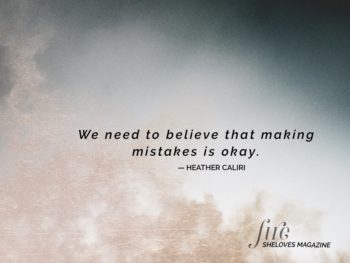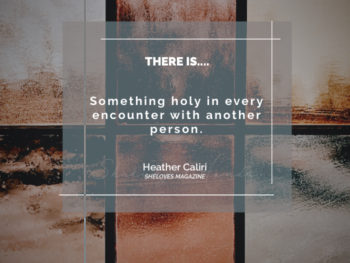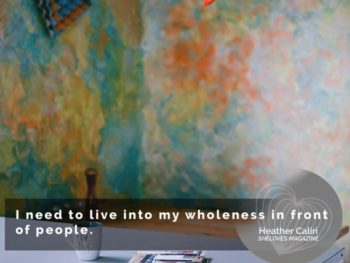
During his year abroad, my friend Terence was descending stairs in one of the busiest subway stations in Japan. He stumbled and fell.
He told me he tumbled like you’d imagine a cartoon character falling down stairs: spinning and bouncing down two long flights before he reached bottom. He lay like a tangled marionette there, bruised and bleeding, his leg broken.
He waited for someone to help him.
No one stopped.
Person after person passed him by, avoiding eye contact, not acknowledging him or even asking him if he were all right.
After he realized that no one would help him, he gathered himself, limped onto the subway made it back to his host family’s house.
At home, he told his host mother that no one had stopped, and she said, “Oh, I’m so glad.”
He looked at her in disbelief. “What?”
“Well, it was so kind of them to keep you from being dishonored. Because of course, if they’d helped you, you would have been in their debt. And they knew that as a foreigner, it would be very difficult to go buy the presents necessary to repay them, and that you would not know how to speak to them in the proper way. So they knew it was better not to help, so you would not be dishonored by being indebted to them forever.”
When Terence told me that story, he said it was the point in his trip when he really understood how two cultures could look at the same situation and have two absolutely different responses to it, both logical (depending on their own unique rules and values) and incomprehensible to the other.
And yet when I heard that story, part of me really identified with the Japanese understanding of feeling indebted. Because to some extent, I do the same thing.
Before I ask for help of a friend, I do a long, ritual dance in my head, weighing the appropriateness of the debt I’m going to owe them. Have I done any favors for them in the past? Will I seem needy or desperate? Will it burden them too much?
Often after such a dance, I choose not to ask.
I hate feeling indebted to people. I hate asking for help.
I hate that word: needy. I’m deathly afraid of it.
And the thing is, I’ll look on any request I might make of another human being as needy. Interviewing someone for the blog. Reaching out to ask if they want to join me in a collaborative project. Even, sometimes, inviting them to a dinner I’d love to cook for them.
Why, why do I consider so many things needy?
Being abroad has multiplied my chances to feel indebted. Indebted to the friends I’ve had for a long time, as they provide hospitality and advice, transport and simple companionship. Indebted to the new ones I’m so grateful for: for a recommendation to a doctor’s office, suggestions for activities, or an invitation to a birthday party. Indebted to the stranger in the street as they point me to a bus stop, a street ad, a taxi stand.
Here’s what I’m trying to drill through my skull: this neediness I’m afraid of is simply being human. It is being vulnerable and real. It is acknowledging and accepting whole-heartedly the freely offered, gracious hospitality of others. It is expecting the best of the people around me.
This desire to not seem needy could be turned around: it’s a kind of desire to be in control, to always be above the help others could ask for. It is a weird kind of selfishness.
Look, I don’t want to be too hard on myself. I come from a culture that prizes independence, and pull-yourself-up-bootstrappiness. I think Americans are good at the generosity of giving, but the receiving of hospitality, of help, of seeing themselves as in need? That comes harder.
And I think we’re impoverished by it. Because this dance of giving and receiving is the very stuff of love.
This year, I’ve made more of a habit of asking for help. Of revealing a need.
And I’ve seen this: exposing my own lack creates a space to see just how amazing people are.
When I practice neediness now, I’m surprised by people’s generosity. I’m trying to do a better job of not being surprised anymore.
How have you received hospitality this week? How have you revealed your own neediness?














 All I know about creativity I learned from washing dishes
All I know about creativity I learned from washing dishes
Hi Heather. I’ve been reading your blog since you interviewed Patricia and have been enjoying it immensely for different reasons but have remained silent ’til now. It just seems wrong to not write since this post now that you brought up another commonality. You’ve hit so much that is part of me, it has been weird and wonderful. You’re in Argentina. I was born there and my mom is Argentinean. You homeschool – leaning on unschooling; so am I. (I live in Canada though.) I grew up in Japan (my dad’s Japanese), and your friends story and how you digest it and articulate it is resonating here… though I’m an extrovert who was perplexed and couldn’t put those thoughts together while growing up! I appreciate your sensitivity and the insights I get into a place of my birth. So much of Buenos Aires is a mystery to me even though I’ve visited many times because I was a child for the most part. Anyway, I had meant to write something a couple of posts ago, but here I am now! Keep up the good work 😉
Apparently I need to move to Canada 🙂 Just to make the twin-ship official. I did spend my honeymoon there, eh?
Thank you so much for this comment, Karina! I love synchronicity, and I love hearing about people with such amazing cultural backgrounds. I love seeing the push and pull of cultures when they collide–they produce so much richness. All blessings to you, and looking forward to keeping up this conversation!
I had a similar experience happen to me when I was living in Tokyo. I was 8 months pregnant and was wearing shoes with a heel, and, unsurprisingly tripped. I fell right in the middle of a busy intersection while crossing and no one offered to help. Literally, people walked around me and did not make eye contact! I ended up ok and so did our baby, but it was an international experience I will not forget. We lived there for 3 years and at that point I had been there for 2. I understood the whole gift exchange thing, but I could not understand why no one could give me their hand for a help up. We did love living in Japan though.
Ouch–I am sprawled on the pavement with you. I think that’s one of the hardest things about living abroad: accepting those differences that seem hurtful, and deciding not to take them personally–and knowing that I might be offending inadvertently too.
Oh, man. I am learning this first-hand right at this very moment. We’re 5 months into living overseas (Thailand) and my husband took his first work trip away from us (me, 2 small kiddos) this week. I rallied up a ton of prayer support back in the US, but also realized that I desperately needed help and support here as well. I really had to work through having to ask friends that I had known for 4 months or less for help. It was humbling and it felt odd being so vulnerable with very new friends. But, just as you said, it was amazing to watch peoples’ responses. So generous and supportive!
I’ve been told by others who have lived overseas longer than asking for help can actually deepen friendships much more quickly – it’s just a unique spot of needing each other differently when none of you has the family, etc. support system you once had back in your home culture.
And you know what? I look forward to when I am not merely the needy one, but also the one who someone else asks for help. We need each other and that’s just the truth of it, isn’t it?
Absolutely, Dawn! I found such a special pleasure in being able to help someone while I was abroad–you feel a sense of pride in finally being useful 🙂 That neediness opens doors, it opens hearts, especially our own.